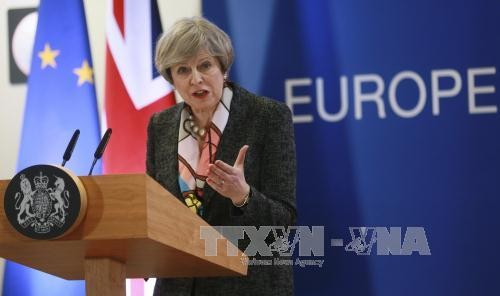(VOVWORLD) -British voters cast their votes in a general election on Thursday. The results of the election will impact Brexit negotiations with the EU. VOV’s foreign-desk editor comments.
 British Prime Minister Theresa May (Photo: EPA/VNA) British Prime Minister Theresa May (Photo: EPA/VNA) |
The parliamentary election offered candidates from the ruling Conservative Party, the Labor Party, the Liberal Democrats, the Scottish National Party, the Green Party, the UK Independence Party, and the Palid Cymru Party of Wales. But it was primarily a race between the Conservative Party of Prime Minister Theresa May and the opposition Labor Party led by Jeremy Corbyn.
Voters are electing 650 Members of Parliament (MP). The leader of the Party with the largest number of MPs will become the new Prime Minister and form a new government. Security in the UK has been tightened after 2 recent terrorist attacks.
Major parties’ views on Brexit
Brexit was the big issue of the election campaigns. In fact, Prime Minister Theresa May called this election 3 years earlier than scheduled as the only way to ensure political stability as the UK enters negotiations with the EU. In her campaign, May championed the British voters’ decision to leave to the EU, optimistic that her Conservative Party can lead the negotiations to a success, making the UK a major global trading nation, stronger, fairer, more united, more secure, and more prosperous. May also declared the tough stance that “no deal is better than a bad deal,” and warned of walking away from the negotiating table if the EU insists that the UK pay 100 billion pounds as it has suggested. Some British voters have praised May for this stance. Others worry her tough stance may result in huge losses by the investment, banking, and finance sectors.
Labor Party leader Jeremy Corbyn has taken a softer stance prioritizing the UK’ free access to the EU market. He emphasized the EU’s importance to the UK economy, rejects “no deal”, and urges the most rational deal. Keir Starmer, Labor’s Brexit spokesman, said EU citizens contribute and are part of the British society, and should not be used as bargaining chips. Starmer vowed to guarantee the rights of EU citizens if the Labour Party is elected to govern and to seek reciprocal rights for UK citizens in the EU.
Post-election challenges
Whoever wins Thursday’s election will have to deal with terrorist threats and economic difficulties. The UK intelligence service has identified 23,000 Islamist extremists living in the UK who are potential terrorists. Meanwhile, anti-Muslim crimes reach a record high level this year in London. The UK will need to maintain its anti-terror alliance with the EU no matter which Party forms the next government.
Recent statistics show the UK economy is slowing down as Brexit negotiations loom. Investment prospects are dimmed by the uncertainty around the Brexit trade talks. Carolyn Fairbairn, who leads the business lobby group of the Confederation of British Industry, said “the Government must make sure that the terms of the deal to leave ensure stability, prosperity, and improved living standards.”
Nearly one year after the June 23 Brexit referendum, British voters are electing MPs to handle the UK-EU divorce settlement, protect the British interests, and effectively fight terrorism. So, the winning Party will need to put together a strong, united government going into Brexit negotiations, which will begin just 11 days after the election.